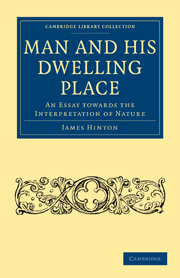Book contents
- Frontmatter
- Contents
- INTRODUCTION
- BOOK I OF SCIENCE
- BOOK II OF PHILOSOPHY
- CHAP. I OF MAN
- CHAP. II OF THE WORLD
- CHAP. III OF IDEALISM: AND THE PROPER MEANING OF THE WORD MATTER
- CHAP. IV OF SCEPTICISM: AND THE GROUNDS OF KNOWLEDGE
- CHAP. V OF POSITIVISM: AND THE RELATION OF SCIENCE TO PHILOSOPHY
- CHAP. VI OF MYSTICISM: AND THE USE OF THE INTELLECT
- CHAP. VII OF NEGATION
- BOOK III OF RELIGION
- BOOK IV OF ETHICS
- BOOK V DIALOGUES
CHAP. III - OF IDEALISM: AND THE PROPER MEANING OF THE WORD MATTER
Published online by Cambridge University Press: 29 August 2010
- Frontmatter
- Contents
- INTRODUCTION
- BOOK I OF SCIENCE
- BOOK II OF PHILOSOPHY
- CHAP. I OF MAN
- CHAP. II OF THE WORLD
- CHAP. III OF IDEALISM: AND THE PROPER MEANING OF THE WORD MATTER
- CHAP. IV OF SCEPTICISM: AND THE GROUNDS OF KNOWLEDGE
- CHAP. V OF POSITIVISM: AND THE RELATION OF SCIENCE TO PHILOSOPHY
- CHAP. VI OF MYSTICISM: AND THE USE OF THE INTELLECT
- CHAP. VII OF NEGATION
- BOOK III OF RELIGION
- BOOK IV OF ETHICS
- BOOK V DIALOGUES
Summary
We first raise a dust and then complain that we cannot see.
Bishop Berkeley.IN nature, when one thing ceases another takes its place. For example: if wood be burnt, it is resolved into smoke and ashes. And these different things we regard as forms of the same essential existence. Thus it is easy to see the necessity of the conception of matter: while all particular things change or cease, there must be something which does pot cease; something of which all these things that change are forms, a ‘substratum’ which is the same in all. This conception, that the world consists of an unchanging matter, is a very obvious and natural one. It could not but have occurred to men, and have been commended to them by its apparent self-evidence and necessity. Nor does it seem easy to understand, at first, how the existence of matter should have been called in question, and have become the watchword of an apparently interminable strife. For the dispute concerning matter shows no sign of coming to an end. In spite of all attempts to close it, or to represent it as compromised, it is incessantly renewed. Men of science, as well as metaphysicians, descend into the arena.
But this curious episode in man's history becomes quite intelligible, when it is viewed from the true vantage ground. We may see why matter must be asserted, why it must be denied; why the denial of it seems ridiculous, yet cannot be refuted; why the whole dispute appears absurd, and yet why men cannot disentangle themselves from it, or can only avoid it by refusing to think at all on some questions of the greatest natural interest and attractiveness.
- Type
- Chapter
- Information
- Man and his Dwelling PlaceAn Essay towards the Interpretation of Nature, pp. 111 - 137Publisher: Cambridge University PressPrint publication year: 2009First published in: 1859



